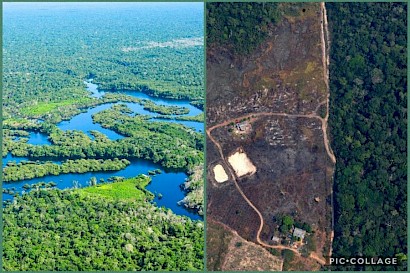What’s next for the Amazon?
 Environmentalists in Brazil are breathing a bit more easily after Luiz Inácio Lula da Silva, who made climate a cornerstone of his campaign, won the country’s presidential election on Sunday.
Environmentalists in Brazil are breathing a bit more easily after Luiz Inácio Lula da Silva, who made climate a cornerstone of his campaign, won the country’s presidential election on Sunday.
Da Silva, the former president better known simply as Lula, unseated the incumbent president, Jair Bolsonaro, whose four-year term saw a sharp increase in Amazon deforestation.
Lula faces big challenges, though. Bolsonaro’s policies still resonate with many Brazilians. The incumbent won the popular vote in more than half of the states that make up the forest. In those areas, mining and other industries provide some of the very few economic opportunities.
All of this matters for the climate because, right now, the Amazon locks away and stores huge amounts of planet-warming carbon dioxide. In the language of global warming, it’s what’s known as a carbon sink. But further deforestation risks turning the jungle into a huge net emitter of greenhouse gases.
Today I want to tell you what people from both sides of this struggle expect from the new government, and how the outcome may shape humanity’s collective future.
Back to a plan that worked
Policy analysts I talked to say they expect Lula to bring back the cornerstone of his environmental policy when he was last president, between 2003 and 2010. It was multiyear plan to reduce deforestation rates by strengthening environmental protection agencies, bolstering law enforcement and creating protected areas in strategic locations.
Between 2004 and 2012, the plan helped bring deforestation down 80 percent. Had it been kept in place, the rate of Amazon forest destruction would be a third of what it is now by some estimates. But the plan was dismantled by Bolsonaro — who favored logging, mining and ranching, sometimes tacitly endorsing illegal activities — in the early days of his presidency.
Even with a new president, switching tracks could be tough. Política Por Inteiro, a think tank that tracks environmental policy, identified 401 rules, regulations and policies issued by the Bolsonaro administration that it says are harmful to climate and the environment.
That’s a lot. The Biden administration targeted or overturned 173 of former President Donald J. Trump’s environmental actions, according to the Washington Post.
“We will have to rush to rebuild everything that was lost,” Natalie Unterstell, who heads the think tank, told me on Sunday.
Working with a conservative Congress
In October, Brazilians elected the most conservative Congress since the country returned to democracy in 1985. Many new deputies, like Ricardo Salles, Bolsonaro’s former environment minister, are close allies of the departing president.
They want to legalize mining on Indigenous lands and to make it easier for people who grabbed and deforested public lands to take formal ownership of the land. Many ordinary Brazilians and local political leaders in the Amazon support these ideas. They see current laws as barriers to the region’s economic growth.
The struggle looks a lot like the one in the United States between progressives and conservatives over fossil fuels. But there’s a catch: In Brazil, the progressive side doesn’t have strong alternative proposals to create environmentally friendly jobs in the forest.
José Sebold, a cattle farmer in Pará State, one of the most deforested parts of the Amazon, told me people there were already protesting Lula’s victory, which they saw as an obstacle to their ability to earn a living.
“I think there will be a war, people won’t accept it,” he told me. “People must be allowed to work.”
Indigenous people get more say
Lula promised to create a ministry for Indigenous people, to be headed by an Indigenous person. He also strongly backed Indigenous people in the election for Congress in October. Only two of them won seats in the legislative body, but that’s still the highest number of Indigenous deputies in Brazil’s history.
Indigenous activists say they want a lot more. Adriano Karipuna, a leader of the Karipuna people, told me the inclusion of Native Brazilians in the government can’t be strictly symbolic.
“We never had that, an Indigenous ministry,” he said. “But we want representation throughout the administration.”
A realization of that ambition could be a win for the environment. According to researchers, Indigenous people are highly effective managers of natural resources. Places where they live and run their own affairs are often better preserved than government-controlled reserves with the highest levels of protection.
Karipuna told me he’d be keeping a close eye to ensure that promises are kept. For now, though, he’s just relieved to see a change in leadership.
“The important thing is that we prevailed,” he said.
You can return to the main Market News page, or press the Back button on your browser.

